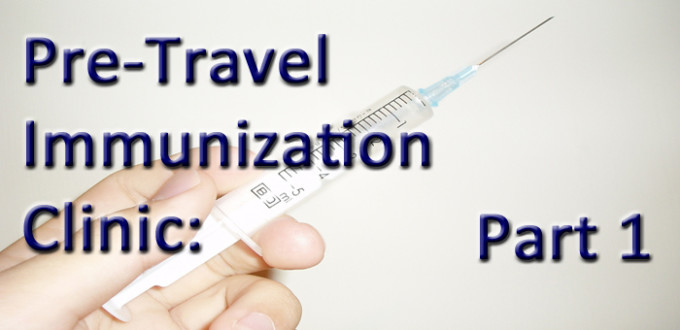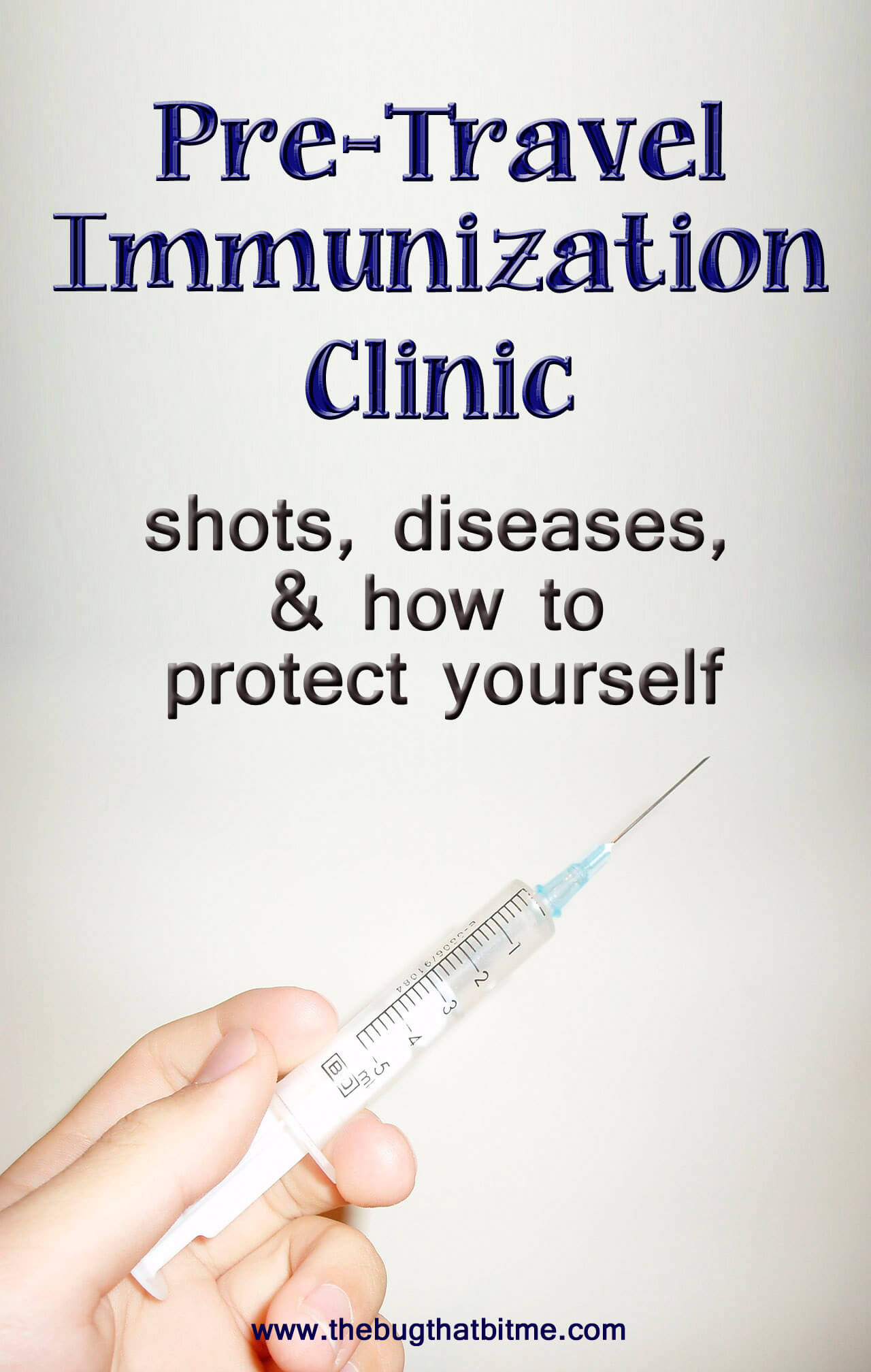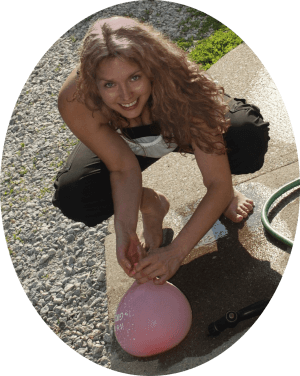Vaccines are a controversial subject. I stand firmly in the for-them court, which is why, six months before my trip to Southeast Asia, I made an appointment at an independent travel clinic. In Canada, you can also visit the community health clinics for free, but the wait times were long and appointment times less conducive to my schedule. Little did I know that the $50 I shelled out for my appointment was the tip of the iceberg when it came to the cost of protecting myself!
This one is long and detailed with no pretty pictures, so grab a cup of chai and curl up!
I’ll start off by saying that the clinic I went to really impressed me. I had to fill out a questionnaire beforehand listing the places I was travelling, when, for how long, whether solo or with a group, health concerns, medications, etc. When I got to my appointment, this woman had done her homework! She was exceptionally well-versed in both my chosen travel locations and the immunizations required for those areas. She spent two hours with me going over my trip and we talked about each vaccine in detail, including cost, side effects, and the reality of whether I really needed it or not.
Due to a condition I have, it was determined that I should not be getting any live vaccines. An example of this is the Yellow Fever shot, which, luckily, I don’t need for the countries I’m visiting. She told me that several countries require proof of this vaccine before allowing you in. I didn’t know that.
My trip is going to be a solo trip, covering large areas of Thailand, both rural and urban, Malaysia, urban, Singapore, urban, and Indonesia, both rural and urban. From there, she broke each region down into possible risks. I received a detailed stack of papers, which we went over one by one.
Note that I included the price, based on Ontario costs. I’m sure the free vaccines in Ontario are also free in other provinces/territories, but I didn’t want to include that without definite information. Your local health unit, doctor or pharmacist should be able to give you that info.
Thailand, Malaysia, Singapore & Indonesia
For this itinerary, this is what was recommended:
Vaccine Preventable Diseases
hepatitis A
hepatitis B
influenza
Japanese encephalitis
rabies
typhoid fever
Malaria is in its own category
Other Diseases
avian influenza
chikungunya
dengue fever
hand, foot and mouth disease
leptospirosis
rickettsial infections
schistosomiasis
traveller’s diarrhea
tuberculosis
Phew! Kind of makes a girl want to curl up with her bottle of hand sanitizer or travel in a bubble!
I’d never even heard of some of those diseases. I wondered if my imagination was worse than the reality of them. I envisioned my nose falling off with leptospirosis. I looked it up. No nose loss, but severe bleeding from the lungs. It is transmitted by the urine of an infected animal and is contagious as long as the urine is wet. Seems easy enough to avoid. I don’t plan on getting peed on.
“Kind of makes a girl want to curl up
with her bottle of hand sanitizer!”
So I’ll break down what was recommended with cost and also my decision on whether to get them or not. Some of my decisions were based on cost, others on personal opinion.
The timing of vaccines where multiple shots are needed are written out like this: 0-1-6. In this case, the first shot is immediate, the second within 1 month, the final shot within 6 months.
Yellow Fever
Not needed, but in the report it states that if you have an air transit stop in a “required if coming from” country, you may need the Yellow Fever vaccine. It’s worth checking out before you travel. Note that this vaccine in Canada is $800. Holy crap! It is a live vaccine, so if you have any medical conditions, especially those having to do with the immune system, make sure you are okay to get a live vaccine.
Hepatitis A & B – Twinrix
This vaccine is given by injection, requires 3 shots, 0-1-6, total cost $210.
Recommended for Indonesia, Malaysia and Thailand, and for Singapore if you have “adventurous dietary habits” (I do!), are staying for a prolonged time or travelling to rural areas.
This vaccine starts working after the last injection. This hepatitis A vaccine component last for 20 years or more, the hepatitis B for at least 15 years.
I got this vaccine. It seemed like a no-brainer for several countries I’ve visited and plan to visit. I had my first two shots and had no reaction, just a sore arm with the second shot.
Typhoid Fever
This vaccine is given by injection, requires 1 shot, total cost $40.
Recommended for Indonesia, Malaysia and Thailand, and for Singapore if you are a “risk-averse traveller.” Huh?
I will be getting this vaccine at the time of my second Twinrix vaccine. I plan to eat at street stalls and markets. They are not the most hygienic of places. Typhoid is spread by eating or drinking food or water contaminated by the feces of an infected person. Yeah, it’s gross, but realistic.
This vaccine starts working 1 week after injection. A booster dose is needed every 2 years.
I should point out that I’m travelling by myself. I’m being more cautious than I usually am, because if I get really sick in a rural area with next-to-no language skills, I could be in trouble. When I was younger, I didn’t think twice about this stuff, but I no longer wield the invincibility of youth, so better safe than sorry.
Japanese Encephalitis – Ixiaro
This vaccine is given by injection, requires 2 shots, 0-1, total cost $500.
Recommended for Indonesia rural areas, including Bali, Malaysia in rural areas, Thailand has significant risk in rural areas, much higher risk in Chiang Mai Valley, negligible risk in Singapore.
Japanese encephalitis is spread by infected mosquitos. These mosquitos bite from dusk to dawn. It can cause brain swelling and nerve damage. I already suffer from some nerve problems, so this one scares me a bit. I plan to be in the worst areas of Thailand and Indonesia for a significant amount of time. On the other hand, I was planning to be careful with mosquito repellant anyways, because I don’t want to take malaria pills and prefer not to get dengue or chikungunya, so my risk would be considerably lower, I’m thinking. And there’s that cost!
This vaccine starts working 1 week after the second shot. This vaccine last for 2 years.
Rabies – Rabavert
This vaccine is given by injection, requires 3 shots, 0-7 days-21 or 28 days, total cost $700.
Recommended for Indonesia, Thailand prolonged stays and rural areas, visits to areas more than 24 hours from immune globulin for post-exposure treatment, adventure travel. Immune globulin is not available in Indonesia and travel to Singapore is required to receive it. Malaysia risk is limited to Peninsular Malaysia. Singapore for travellers likely to have contact with bats.
If you are bitten, it is recommended to cleanse the wound with lots of clean water and soap. Let water flush the wound for 15 minutes. I was told to also take seriously all scratches and licks. I don’t think I’d go as far as to see a doctor for a lick, unless I had an open wound.
Note that even with vaccine, a post-exposure prophylaxis (PEP) is required post-exposure. 2 doses of modern cell culture vaccine should be given on days 0 and 3 after exposure. PEP for an unvaccinated person consists of injections of rabies immune globulin and a series of 4 injections of rabies vaccine on days 0, 3, 7, and 14, and a fifth dose on day 28 for immunosuppressed patients. After washing the wound, as much rabies immune globulin as can be injected at the wound site should be. Ew!
My nurse told me rabies immune globulin (RIG) is difficult to access in many countries. If modern cell culture vaccine is available, but access to RIG is delayed, the vaccine series should be started as soon as possible, and RIG may be added to the regimen up to and including day 7.
I also came across this warning from the CDC. “Rabies vaccine was once manufactured from viruses grown in animal brains, and some of these vaccines are still in use in developing countries. Typically, the brain-derived vaccines can be identified if the traveler is offered a large-volume injection (5 mL) daily for approximately 14–21 days. Because of variability of potency in these preparations, which may limit effectiveness, and the risk of adverse reactions, the traveler should not accept these vaccines, but travel to where acceptable vaccines and rabies immune globulin are available.”
This vaccine starts working 2 days after the last dose. A booster dose is needed every 2 years.
I’m also on the fence with this one and will most likely skip it. The cost is prohibitive and I question whether I’ll need it. If I do, I can still get it post-exposure, which would put a serious dent in my travel plans.
Influenza
This vaccine is given by injection, requires 1 shot, free in Ontario.
Recommended for Indonesia, Malaysia, Thailand and Singapore due to year-round risk in the tropics.
I suspect the risk is similar to being at home. I plan to get this shot, as I usually do. I have a son with a respiratory condition, and it is something we do every fall. I know a lot of people have strong views about this one, but I can say I haven’t had the flu in well over 10 years, even when those around me were sick.
Tetanus, diphtheria, pertussis
This vaccine is given by injection, requires 1 shot, free in Ontario.
Recommended for Indonesia, Malaysia, Thailand and Singapore due to increasingly frequent pertussis outbreaks worldwide. Diphtheria cases continue to be reported in SE Asia, as well as other parts of the world. I think it’s smart to have a tetanus shot as well, and since the last one I remember getting was in grade 10, I will get this booster. It is recommended that anyone travelling to indicated countries get a TDP booster.
This vaccine starts working immediately. This booster is good for 10 years.
Measles, mumps, rubella
This vaccine is given by injection, requires 1 or 2 doses, depending on when you were born, 1-28 days. This vaccine is free in Ontario.
Indonesia, Malaysia, Thailand and Singapore, indicated for those born in 1957 or later in US, 1970 or later in Canada and UK, 1966 or later in Australia.
There is currently a measles warning worldwide. The CDC recommends that anyone over 6 months old who is travelling internationally be immunized.
Measles, mumps, and rubella are viruses that are easily spread through the air when an infected person coughs or sneezes. You can become infected when you breathe in air or touch a surface contaminated with virus. The viruses can also be spread through contact with an infected person’s saliva.
My mom told me I had measles when I was a baby, which would render me immune. If you’re not sure if you are, you can get a blood test to confirm immunity. That still puts me at risk of mumps and rubella, however. Probably best to get this one.
Immunity should be developed in 4 weeks after the second shot. This vaccine is good for life.
Varicella (Chickenpox)
This vaccine is given by injection, requires 2 shots, 0-6 weeks, this vaccine is free in Ontario.
Indonesia, Malaysia, Thailand and Singapore, indicated for those born outside the US or born in the US after 1979, except those with adequate vaccination history.
I won’t be getting this one. I’ve had chickenpox. If you’re not sure if you have (although who could forget all that itching), you can get a blood test to confirm immunity.
This vaccine starts working in 3-5 days. This vaccine is good for at least 13 years. It is newer, so there are not firm numbers out yet.
Pneumococcal
This vaccine is given by injection, requires 1 or 2 doses, depending on the type of vaccine you get, 0-6 weeks. I believe this one is free if you are in a high-risk group and live in Ontario.
Indonesia, Malaysia, Thailand and Singapore, indicated adults over 65 and those with chronic disease.
I won’t be getting this one.
This vaccine starts working in 2 to 3 weeks in healthy adults. Antibodies for this vaccine begin to decline 5-10 years after being administered.
That’s it for vaccinations. My next post , Part 2, will move on to the other ways you can die or get extremely ill when exploring the globe. What a fun travel subject!






Thanks Leslie – thorough, as always.
Leah Price recently posted…Garden 15: October 29 – Almost Hallowe’en
I was astonished at the number of precautions suggested. Last time I went to a travel clinic for travel to SE Asia (for a trip that didn’t happen), it was recommended that I get a couple shots and take anti-malaria pills.